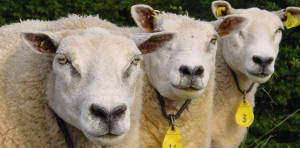In the Name of God, the Merciful, the Compassionate
|

What Is Halal?
| Halal" is a Quranic Term, which means 'Lawful'
or 'Permitted'. Sometimes it is translated as 'Acceptable' or 'Not forbidden'. Halal foods and drinks are permitted for consumption
by Allah- the supreme lawgiver. In the Holy Quran, Allah commands Muslims and all of mankind to eat of the Halal things. Eating
Halal is obligatory. |
|
| The opposite of 'Halal' is "Haram", which means
'Unlawful' or 'Prohibited". The other words used for Haram is 'Unacceptable' or 'Forbidden'. Haram foods and drinks are absolutely
prohibited for consumption by Allah. Eating Haram is forbidden for every Muslim. If a Muslim consumes Haraam foods, he would
be sinful. |
|
| "Mushbooh" is an Arabic term which means 'doubtful'
or 'suspected'. If one does not know the Halal or Haram status of a particular food or drink, such a food or drink is doubtful.
A practicing Muslims prevents himself from consuming doubtful things. |
|
The terms Halal and Haram will be used strictly
to describe food products, meat products, cosmetics, personal care products, food ingredients, beverages and food contact
materials. Which foods are Halal or which foods are Haram, is decided according to the Holy Quran and the Glorious Shariah
(Islamic Law).Most diets and foods are considered to be Halaal unless Islamic Law specifically prohibits them.
The
following products are definitely Halal:
1. Milk (from cows, sheeps, camels or goats).
2. Honey.
3.
Fish.
4. Plants which are not intoxicant.
5. Fresh or naturally frozen vegetables.
6. Fresh or dried
fruits.
7. Legumes like peanuts, cashew nuts, hazel nuts, walnuts, etc.
8. Grains such as wheat, rice, rye,
barley, oat, etc.
Animals such as cows, sheep, goats, deer, moose, chickens, ducks, game birds, etc., are also Halal,
but they must be Zabihah (slaughtered according to Islamic Rites) in order to be suitable for consumption. The procedure is
as follows: the animal must be slaughtered by a Muslim by putting the animal down on the ground (or holding it if it is small)
and slitting it's throat with a very sharp knife to make sure that the main blood vessels are cut. While cutting the throat
of the animal without severing it, the person has to recite "Bismillah Allah-u-Akbar".
The following items have been
categorically spelled out as being Haram:
1. Pig/Swine/Pork and its by-products.
2. Blood and and blood by-products.
3. Carnivorous animals.
4. Reptiles and insects.
5. Halal animals which are not slaughtered according
to the Islamic Law.
6. Animals killed in the name of anyone other than God.
7. The bodies of dead animals
or dead before slaughtering.
8. Alcohol and intoxicants such as Wine, Ethyl Alcohol, and Spirits etc.
The
above mentioned items are Haram and should be strictly avoided by all Muslims.
Foods containing ingredients in the
following are example of Mushbooh:
1. Gelatin.
2. Enzymes.
3. Emulsifiers.
4. Lard.
5.
Glycerol/glycerin etc.
Muslim should avoid such foods containing Mushbooh or questionable ingredients. Before consuming
such items, we have to confirm the source of these ingredients. |
| |
 |
|
|

